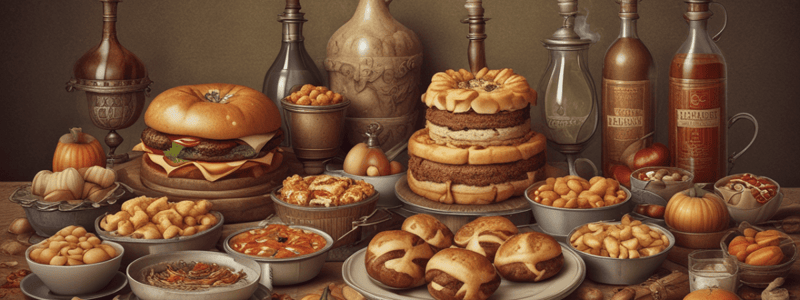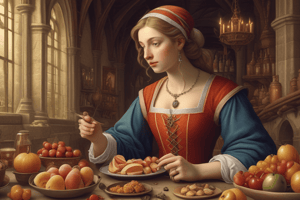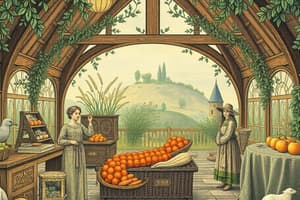Podcast
Questions and Answers
What was the main purpose of medieval fast food in Europe?
What was the main purpose of medieval fast food in Europe?
to cater to travelers and the poor
Why was it difficult for many Londoners to cook at home during the Middle Ages?
Why was it difficult for many Londoners to cook at home during the Middle Ages?
because cooking equipment and fuel were expensive, and the poor lived in tenement housing without furnishings or a hearth
What reasons related to money in medieval Europe contributed to the demand for fast food?
What reasons related to money in medieval Europe contributed to the demand for fast food?
high poverty throughout Europe
What was the social class that medieval fast food primarily catered to?
What was the social class that medieval fast food primarily catered to?
What was the significance of London as a city during the Middle Ages?
What was the significance of London as a city during the Middle Ages?
What three ingredients were used to create soft pretzels in medieval Europe?
What three ingredients were used to create soft pretzels in medieval Europe?
Why did pretzels become a symbol of luck and prosperity in medieval Europe?
Why did pretzels become a symbol of luck and prosperity in medieval Europe?
What was a common practice during Lent in medieval Europe, despite being criticized by religious figures like Robert Ripon?
What was a common practice during Lent in medieval Europe, despite being criticized by religious figures like Robert Ripon?
What sweetener was commonly used in medieval cook shops instead of sugar?
What sweetener was commonly used in medieval cook shops instead of sugar?
What was the original name of the dish that later evolved into what we know as funnel cakes today?
What was the original name of the dish that later evolved into what we know as funnel cakes today?
What was the alternative to cooking at home in medieval times, and how did they operate?
What was the alternative to cooking at home in medieval times, and how did they operate?
What was unique about the cook shops in Bristol, and how did they attract customers?
What was unique about the cook shops in Bristol, and how did they attract customers?
What was a popular fast food item in medieval times, and how did it compare to modern-day fast food?
What was a popular fast food item in medieval times, and how did it compare to modern-day fast food?
What was a major issue with medieval cuisine, and how did it affect the food served at cook shops?
What was a major issue with medieval cuisine, and how did it affect the food served at cook shops?
What was the concept of bread bowls in medieval times, and how did they originate?
What was the concept of bread bowls in medieval times, and how did they originate?
What significant event contributed to the development of a more recognizable version of waffle batter in Europe?
What significant event contributed to the development of a more recognizable version of waffle batter in Europe?
What innovation by the Dutch in the 15th century revolutionized the waffle?
What innovation by the Dutch in the 15th century revolutionized the waffle?
What led to sugar becoming a widely used ingredient in European desserts by the 16th century?
What led to sugar becoming a widely used ingredient in European desserts by the 16th century?
What sweet treats became popular during the 16th century, and what characteristic did they share?
What sweet treats became popular during the 16th century, and what characteristic did they share?
What is the origin of the word 'dessert', and how did its meaning evolve over time?
What is the origin of the word 'dessert', and how did its meaning evolve over time?




